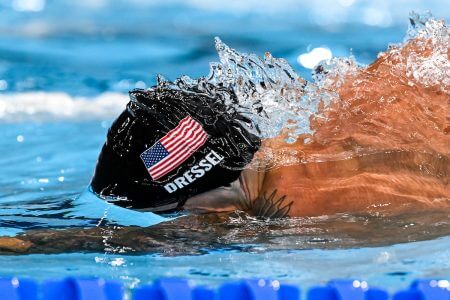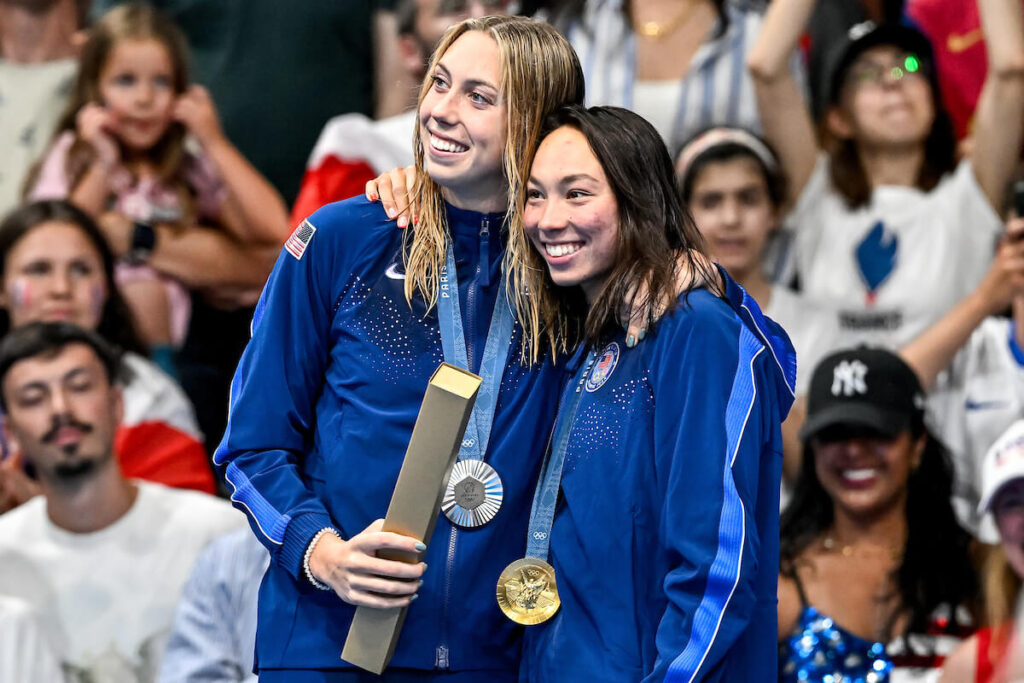Paris Olympics: U.S. Women Shined, Men Struggled on French Soil
For the first time in 20 years, the United States did not reach 30 medals in the pool at the Paris Games. With eight gold medals, the Americans had their lowest number of wins since the 1988 Olympics, and their tally of golds was halved from eight years ago in Rio de Janeiro, a Games which featured three fewer events. For most of the competition, Australia looked poised to win more golds than the U.S., only for the Americans to go on a mini-run in the last two days of the meet to come out on top by one.
Break down the Americans’ 28-medal performance, and a startling pattern emerges: the women accounted for 18 medals; the men, only nine, plus another gold with both women and men contributing in the mixed 400 medley relay.
The U.S. women did just about all that could have been asked of them in Paris, winning medals in 11 out of 14 individual events while missing the podium by just two hundredths in two of the remaining events. In her fourth Olympics, Katie Ledecky added to her jam-packed résumé with gold medals in the 800 and 1500 freestyle, with the 16-lap race making her the first female swimmer to ever win four consecutive golds in one event, and Ledecky also won bronze in the 400 free.
Regan Smith — Photo Courtesy: Andrea Masini / Deepbluemedia / Insidefoto
Torri Huske and Kate Douglass each picked up an individual gold and silver, with Huske winning the 100 butterfly and shocking the field to take second in the 100 free while Douglass won the 200 breaststroke and was the runnerup in the 200 IM. Regan Smith won three individual medals, all silvers, in both backstroke events plus the 200 fly. Gretchen Walsh, Katie Grimes, Emma Weyant, Katharine Berkoff and Paige Madden all finished in the top-three in one event. The women’s 400 medley relay became the first team to ever swim under 3:50, and after entering the Olympics seemingly well behind Australia in both freestyle relays, the Americans acquitted themselves nicely with strong silvers.
Sure, they won more silver medals than gold, but attribute that to the brilliance of Canada’s Summer McIntosh, Aussies Kaylee McKeown and Ariarne Titmus and Swedish sprint legend Sarah Sjostrom. The American women did their jobs.
On the men’s side, however, the picture was much more bleak, with depended-upon veterans faltering while Olympic rookies were unable to match their times from the Olympic Trials or the previous year’s World Championships.
Symbolic of the U.S. men’s struggles was a failure to win an individual gold medal until the very last individual race of the meet, when Bobby Finke went wire-to-wire in the 1500 freestyle and broke a 12-year-old world record in the process. The team needed Finke’s win to continue a streak of winning individual gold in men’s swimming at every Olympics dating back to 1904. In that span, this is only the third time the U.S. men have captured just one individual gold, with the last instance coming in 1956.
There were plenty of highlights, such as veteran Nic Fink reaching the podium for the first time as he tied for silver in the 100 breast, Carson Foster scoring bronze in a 400 IM final that Leon Marchand dominated and Luke Hobson picking up a bronze in a veteran-heavy 200 free final.
While Ryan Murphy claimed bronze in the 100 back, he missed out on the final of the 200-meter race. Caeleb Dressel impressed in winning two events at the U.S. Olympic Trials, but he was plagued by inconsistency in Paris, finishing fifth in the 50 free and missing the final of the 100 fly entirely. A pair of medal-winners from last year’s World Championships, Hunter Armstrong and Matt Fallon, missed the final of their only individual races while rising sprinters Jack Alexy and Chris Guiliano were unable to approach their Trials times while finishing out of medal contention.

Caeleb Dressel — Photo Courtesy: Giorgio Scala / Deepbluemedia / Insidefoto
Even the relays were a mixed bag for the American men: the 400 free relay won gold for the third consecutive Olympics while the 800 free relay team secured a meaningful silver three years after the receiving the inglorious distinction of first American Olympic relay to ever finish off the podium. But to conclude the meet, the men’s medley relay could not hold a lead in the anchor leg as China’s Pan Zhanle stormed ahead to win gold. Aside from the boycotted 1984 Olympics, that marked the first time ever the Americans had not won that race.
The U.S. women had 24 individual finalists in Paris, with both Americans qualifying for the top-eight in 10 out of 14 events and no gold medal decided without an American in the field. On the men’s side, the Americans had just 13 finalists, with no American reaching the final of either butterfly race, and only the 100 free final included two U.S. representatives.
Those results left the Stars and Stripes with plenty of work to do in the four years leading into a home Olympics in Los Angeles, where the expectation will surely be a much larger quantity of gold medals and no doubts about the world’s superior swimming nation after Australia placed a serious scare into the Americans this time around.
Projecting out over the next Olympic cycle, the American women are in far better shape than the men. Sure, Ledecky is 27 years old, and she cannot be expected to maintain her international winning streaks in the distance races forever; just this year, in fact, she was beaten in an 800 free at a local meet for the first time in 12 years. And yes, stalwart breaststroker Lilly King has announced plans to retire before the LA Games while veteran sprinters Simone Manuel and Abbey Weitzeil are closer to the end of their international careers than the beginning.
But the Americans move forward with a multi-talented core that has achieved Olympic success in Paris and, in some instances, Tokyo as well. Smith and Douglass are 22 years old, Huske and Walsh 21 while teenagers Grimes, Claire Weinstein, Erin Gemmell and Alex Shackell all won individual or relay medals. Australia still dominates the freestyle relays, but America has sort of young talent that can continue to grow and close the gap in the coming years.
The men, on the other hand, will have Foster and Hobson looking to build on their performances in Paris and plenty of other talented swimmers needing to reverse the trend after struggling in Paris. The likes of Armstrong, Fallon, Alexy, Guiliano and others could all win medals in four years’ time, as could Thomas Heilman, the youngest U.S. male swimmer since Michael Phelps to qualify for an Olympic team, but only if they can channel the lessons they learned this summer and apply them moving forward.
Beyond the aforementioned swimmers, the men’s prospects in the coming years will depend on the continued development and seasoning of swimmers who have yet to represent the country internationally beyond the junior level. By 2028, Finke, Kieran Smith and Drew Kibler will be 28 while Murphy, Dressel and Fink will all be over 30, with none having committed to remaining in the competitive arena to that point.
In Paris, the U.S. team could only watch as Marchand sent his hometown crowd into a frenzy as he won four gold medals. Marchand, fellow gold medalist Hubert Kos and Canadian butterfly medalists Josh Liendo and Ilya Kharun all train in the United States, and those four all elevated their performance in the Olympic spotlight while the Americans, in many cases, wilted. The pressure will be on to reverse that trend before Los Angeles.

